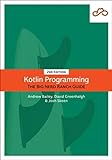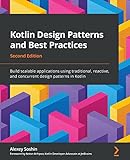In Kotlin, you can pass multiple function implementations by using higher-order functions. These higher-order functions take other functions as parameters, allowing you to pass multiple function implementations as arguments. This is a useful technique for creating flexible and reusable code. To pass multiple function implementations, define a higher-order function that takes functions as parameters, then pass the desired function implementations when calling the higher-order function. This allows you to easily switch between different behavior by passing different functions as arguments. Overall, passing multiple function implementations in Kotlin is achieved through the use of higher-order functions, making your code more dynamic and adaptable.
What is the strategy for dealing with different function signatures when passing multiple function implementations in kotlin?
One strategy for dealing with different function signatures when passing multiple function implementations in Kotlin is to use lambda expressions or function references. By defining a functional interface with a common signature that each function implementation must adhere to, the functions can be passed as arguments and called within the higher-order function.
For example, suppose you have two functions with different signatures:
1 2 3 4 5 6 7 |
fun sum(a: Int, b: Int): Int { return a + b } fun multiply(a: Int, b: Int, c: Int): Int { return a * b * c } |
You can define a functional interface with a common signature:
1 2 3 |
interface MathOperation { fun operate(vararg operands: Int): Int } |
And then pass the function implementations using lambda expressions or function references:
1 2 3 4 5 6 7 |
fun performOperation(operation: MathOperation) { val result = operation.operate(2, 3, 4) println("Result: $result") } performOperation { operands -> sum(operands[0], operands[1]) } performOperation(::multiply) |
This way, you can handle functions with different signatures in a consistent manner by using a common interface or signature for the functions being passed.
How to pass function literals as function implementations in kotlin?
In Kotlin, you can pass function literals as function implementations by using higher-order functions.
Here is an example of how you can do this:
- Define a higher-order function that takes a function as a parameter:
1 2 3 |
fun higherOrderFunction(function: (Int, Int) -> Int): Int { return function(10, 20) } |
- Define a function literal (also known as a lambda expression) that you want to pass as the function implementation:
1
|
val sum: (Int, Int) -> Int = { a, b -> a + b }
|
- Call the higher-order function and pass the function literal as the argument:
1 2 |
val result = higherOrderFunction(sum) println(result) // Output: 30 |
In this example, we defined a higher-order function higherOrderFunction that takes a function as a parameter. We then defined a function literal sum that calculates the sum of two integers. Finally, we called the higherOrderFunction and passed the sum function as the argument. The result is 30, which is the sum of 10 and 20.
How to use function composition when passing multiple function implementations in kotlin?
In Kotlin, you can use function composition to combine multiple function implementations into a single function by chaining them together. Here is an example of how you can achieve function composition when passing multiple functions:
1 2 3 4 5 6 7 8 9 10 11 12 13 14 |
fun main() { val add2: (Int) -> Int = { it + 2 } val square: (Int) -> Int = { it * it } // Function composition val squareAndAdd2 = compose(square, add2) val result = squareAndAdd2(3) println(result) // Output: 11 } fun compose(f: (Int) -> Int, g: (Int) -> Int): (Int) -> Int { return { x -> f(g(x)) } } |
In this example, we have two functions add2 and square. We then define a compose function that takes two functions as parameters and returns a new function that applies the second function g first and then applies the first function f to the result.
You can then use the compose function to chain multiple function implementations together to create a new function that combines their effects. In the example above, we combine the square and add2 functions to create a new function squareAndAdd2 that first squares the input and then adds 2 to the result.
How to pass default parameter values in function implementations in kotlin?
To pass default parameter values in function implementations in Kotlin, you can assign a default value to the parameter when defining the function.
Here's an example:
1 2 3 4 5 6 7 8 |
fun greet(name: String = "World") { println("Hello, $name!") } fun main() { greet() // Output: Hello, World! greet("John") // Output: Hello, John! } |
In the above example, the greet function has a default parameter value of "World" for the name parameter. This means that if no argument is provided when calling the function, it will use the default value. You can also override the default value by providing a different argument, as shown in the main function.
What is the advantage of defining function types when passing multiple function implementations in kotlin?
Defining function types when passing multiple function implementations in Kotlin provides several advantages:
- Improved readability: By explicitly defining the function types, it helps to make the code more readable and understandable. Developers can easily see what types of functions are expected as arguments and what types are returned.
- Type safety: Defining function types ensures type safety, as the compiler can check if the correct types of functions are passed as arguments to the function.
- Reduced errors: By specifying function types, it reduces the chances of passing incorrect functions or making mistakes in function implementations.
- Flexibility: By defining function types, it allows for more flexibility in passing different types of functions as arguments to the function, making the code more versatile and adaptable.
- Encapsulation: Defining function types allows for encapsulation of functionality, separating the implementation details of the functions from the rest of the code. This can help in making the code more modular and maintainable.









